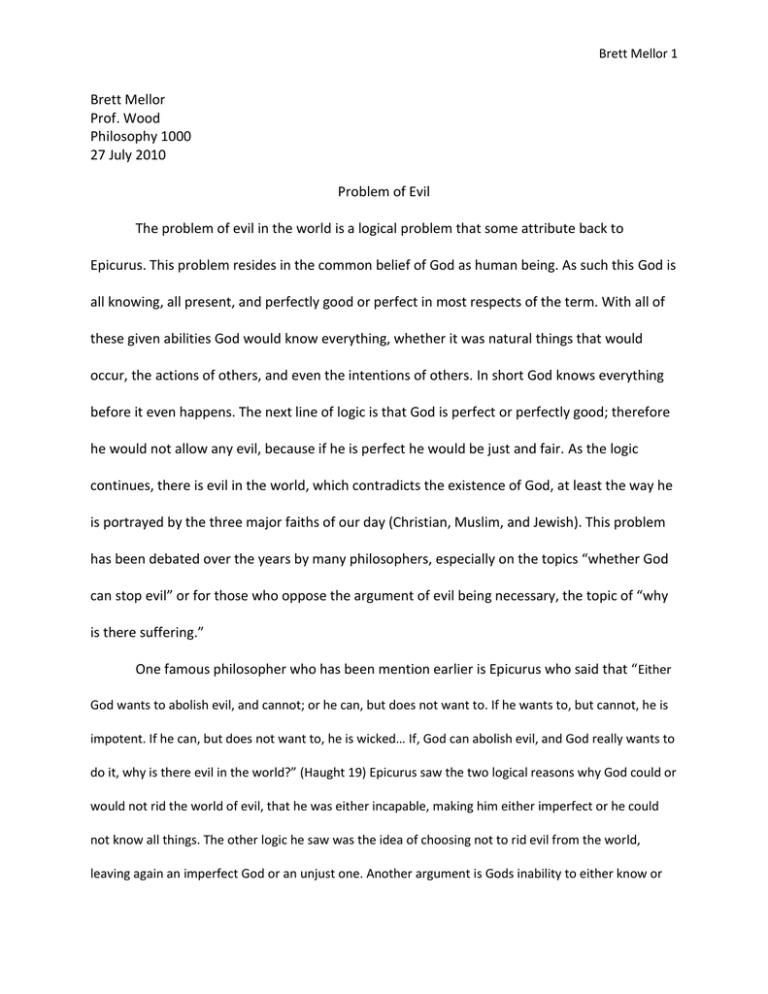Works Cited
advertisement

Brett Mellor 1 Brett Mellor Prof. Wood Philosophy 1000 27 July 2010 Problem of Evil The problem of evil in the world is a logical problem that some attribute back to Epicurus. This problem resides in the common belief of God as human being. As such this God is all knowing, all present, and perfectly good or perfect in most respects of the term. With all of these given abilities God would know everything, whether it was natural things that would occur, the actions of others, and even the intentions of others. In short God knows everything before it even happens. The next line of logic is that God is perfect or perfectly good; therefore he would not allow any evil, because if he is perfect he would be just and fair. As the logic continues, there is evil in the world, which contradicts the existence of God, at least the way he is portrayed by the three major faiths of our day (Christian, Muslim, and Jewish). This problem has been debated over the years by many philosophers, especially on the topics “whether God can stop evil” or for those who oppose the argument of evil being necessary, the topic of “why is there suffering.” One famous philosopher who has been mention earlier is Epicurus who said that “ Either God wants to abolish evil, and cannot; or he can, but does not want to. If he wants to, but cannot, he is impotent. If he can, but does not want to, he is wicked… If, God can abolish evil, and God really wants to do it, why is there evil in the world?” (Haught 19) Epicurus saw the two logical reasons why God could or would not rid the world of evil, that he was either incapable, making him either imperfect or he could not know all things. The other logic he saw was the idea of choosing not to rid evil from the world, leaving again an imperfect God or an unjust one. Another argument is Gods inability to either know or Brett Mellor 2 stop the source of evil, such as the being called Satan, or natural events that create evil. Diodorus Siculus, a Greek historian points out that “The myths about Hades and the gods, although they are pure invention, help make men virtuous.” (Haught 19) Though optimistic of the benefits like others, Siculus claims them as mere invention to instill virtue or fear into men. Not only do philosophers argue that if God does not stop evil, God does not exist, but the other argument of “why is there suffering.” William Rowe famously outlines his story of a suffering fawn when “a fawn, burned in a distant forest fire, lies in agony for days before dying. We see no good served by God’s allowing this suffering.” (16) Not only do we see the existence of evil, but Rowe’s argument takes the case of showing that we do not see God’s good in the world by the presence of non-essential suffering for no reasonable good. This example though just one small example which does not represent the whole of society or the world does show another contradiction to a God who is good. In these arguments we explore contradictions of what is good and the presence of evil in a world ruled by a perfect being. But to be an argument, there needs to be another point of view. Peter Kreeft makes arguments against the problem of evil. He lists these solutions in four sets, the first, “Evil is not a thing but a wrong choice” (Kreeft) he paints this principle by God’s creation that is recorded in the bible. He outlines that God created all good things, and evil is an illusion. The second point is that “The all-powerful God gave us a share in his power to choose freely” (55-58) the origination of evil is choice; Adam and Eve choose the wrong choice and now the earth experiences evil from that choice. Third, the practice of following Christ and using his atonement overcomes the evil in this world; freedom would not exist if there was no potential to choose evil. Fourth, suffering can lead to greater good and we cannot always know the reasoning behind what God does. In summary Kreeft argues for the balance of choice and the necessity for evil and suffering for man to grow, but there are logical holes in his appeal to reason. Brett Mellor 3 There are logical problems in all of his points that are made. Kreeft paints God as creating the earth and all things as good, but in the scriptures we find that Satan was one of God’s angels who was cast out for rebellion. Ergo, Satan was something that God created, who “creates evil” in the biblical sense, therefore God has created evil. A line of argument against that would be that Satan chooses evil, but even by allowing choice denotes that there had to be different options, one being evil. This tends to contradict his first and third point; also his second point the “power to choose freely” (55-58) is not something done freely. Humans are forced to choose every day, everything you do requires choice, and even doing nothing is a choice. Decisions face us every day whether we want them or not, such as whether to get out of bed, or even eat. The last example is also not very concrete in its implication, Kreeft argues that some evil and suffering is and can be necessary for growth. He also points out that we don’t always know the will of God, this could be true but the first half is where the problem comes in. For example, person A comes home from work in the later hours of the night. Person A finds that two men persons B and C come and force person into the house at gun point. They then proceed to rape and then beat person A to the edge of death, person A is found a few hours later and rushed to the hospital. This person is left in a handicap state for the rest of their life and the criminals were never identified. This example is not only an emotional appeal by how terrible this could be, but it is also an appeal to logic. According to Kreeft, suffering and evil can be for the greater good, in this circumstance how would this fall under the greater good for this person or the criminals? Person A is unable to perform any higher functions, let alone grow or learn, plus persons B and C may never find punishment and potential growth from this situation. Though Kreeft does make good points about the argument of evil, it has some problems to face as well. In the end Kreeft does make some arguments for God in the problem of evil, but falls under scrutiny, other arguments for and against may do the same, but there are still fundamentals from Epicurus and others. This problem still lies in fundamentals of what is evil? What does it serve in the Brett Mellor 4 world, and is God responsible for it or have need of it? Also the principle of suffering applies to society in the same way, what is its role and does it show a lack of goodness from God? For these questions to be answered, logic and reason need to connect why evil and suffering exist, and how God plays a role in the need for it. Brett Mellor 5 Works Cited Haught, James A. "2000 Years of Disbelief." Haught, James A. Famous people with the courage to doubt. Prometheus Books, 1996. 19. Kreeft, Peter. "Fundamentals of the Faith." Kreeft, Peter. Essays in Christian Apologetics. Ignatius Press, 1988. 55-58. Rowe, William L. "The Problem of Evil and Some Varieties of Atheism." American Philosophical Quarterly (1979): 16.



